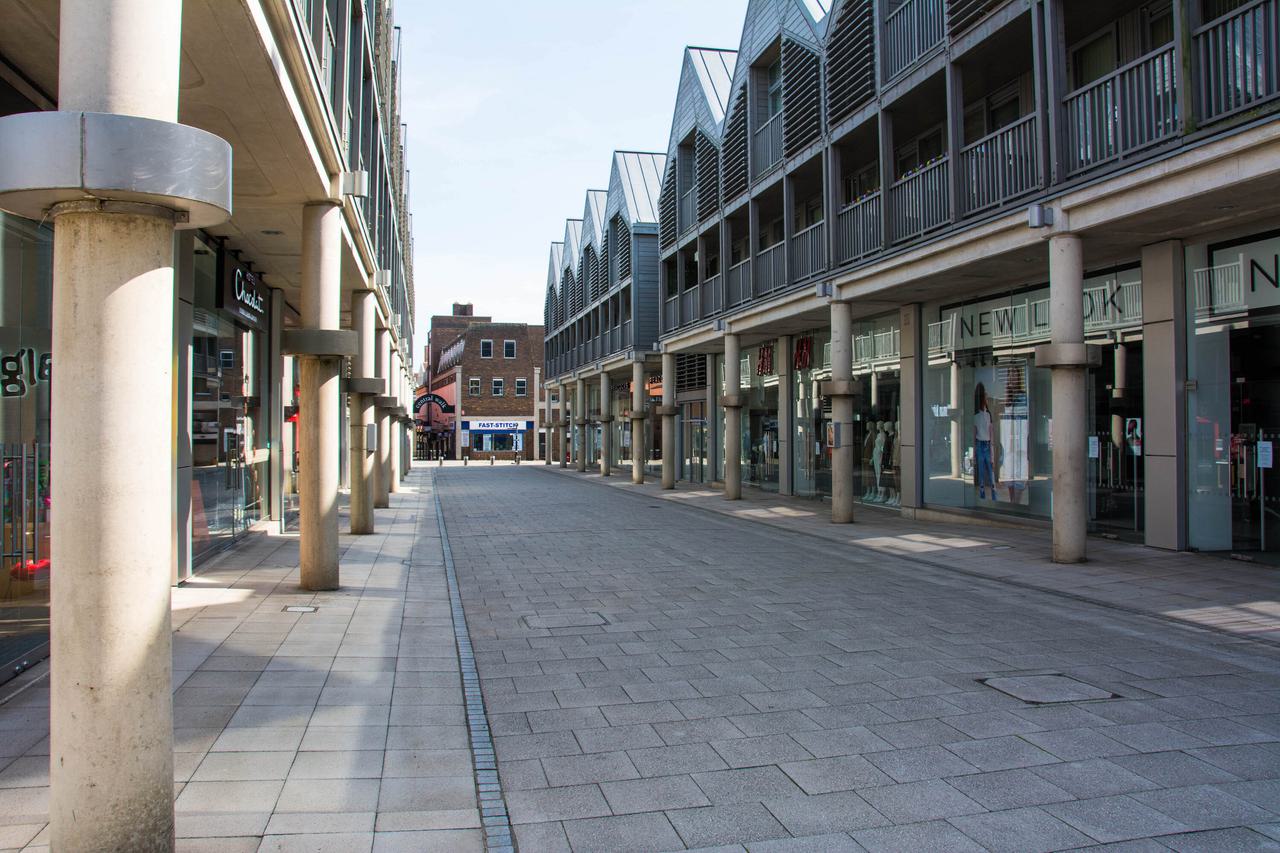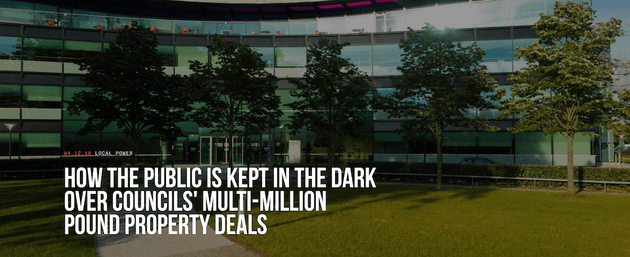
Councils' bets on property market 'battered' by Covid-19 closures
Councils who borrowed billions to make risky investments in offices and retail parks have taken a “battering” during the coronavirus pandemic as tenants default on rent. The shortfall could put frontline services at risk, as some councils depend on commercial rents for the majority of those budgets, the Bureau can reveal.
The Bureau has previously shown how local authorities borrowed money to gamble on property investments in the hope rents would make up for major cuts in Westminster funding. The sudden fall in commercial rents, along with a slump in traditional forms of revenue such as business rates and council tax caused by the pandemic, has left councils in a double bind.
The British Property Federation told the Bureau that only two thirds of all office rents and one third of all retail rents were paid in the first quarter of the year. The federation expected those figures to halve again in June. Property groups are finding it difficult to sell retail parks and analysts are projecting lower office rents for years to come.
On Monday the Public Accounts Committee, parliament’s spending watchdog, began hearing evidence on why local authorities have invested so much money in commercial property outside their council areas. It follows an investigation by the Bureau into these investments and a report by the National Audit Office (NAO) earlier this year, which warned the government may have to intervene to ”protect against risks” from this strategy.
Since 2010, government funding for councils has been halved, with £15bn lost to cuts. Many councils turned to imaginative money-making schemes to maintain essential services. These included massive sell-offs of council property, and borrowing money cheaply and investing in offices and retail.
It proved a popular policy. As revealed by the Bureau, the number of councils investing in property doubled in the space of two years. A recent report by the NAO said councils had spent £6.6bn on commercial property since the end of March 2016. Across the country, council services – many of which are now on the frontline of the battle against Covid-19 – have been tied to the vagaries of the property market.
The government has provided more than £3bn to keep councils going through the pandemic – as residents struggle to pay council tax and revenue from parking fines slumps – but one council leader told the committee up to four times more could be needed. Moreover, this funding is not meant to cover losses from commercial investment.
Rob Whiteman, chief executive of Chartered Institute of Public Finance and Accountancy, told the Public Accounts Committee that he was worried about “a few councils that are overexposed”.
Nick Dunbar, a senior consultant for Vedanta Hedging, which provides financial advice for local authorities, told the Bureau the Covid-19 crisis had caused a “massive plunge” in the value of the sort of commercial property councils had invested in. “Anything to do with bringing in rents is getting hammered, because people can't go into offices and shops.”
He added that closures, cutbacks and a likely shift towards home-working as the lockdown eases could see businesses vacate offices. In 2018 the Bureau revealed that Spelthorne borough council had invested £1bn in office buildings. Dunbar added: “It's early days as we are still in the middle of the epidemic, but the question is: what is the new normal going to be? The business model of the Spelthornes – where they are looking at a stream of revenue from offices for a very long period of time, to repay loans which are 20, 30, 40 years in the future – could see a scary outcome for residents in those areas.”
Some councils are heavily dependent on income from property investments to provide services. Woking borough council in Surrey reported a month before lockdown that its investment and rental income was the equivalent of 88% of its budget for services. Next year that figure was predicted to rise to 98%.
Since the end of March 2016 the council has spent £206m on 12 commercial properties. It also has pre-existing interests in two shopping centres. The purchases were financed through borrowing. While the council has been making a reasonably healthy net profit, it predicted this would narrow significantly in the coming years – and that was before the effects of coronavirus were known.
Reserves are in place to cope with temporary falls in rental income but “should there be a significant permanent reduction in income, service provision would need to be reviewed”, the council’s report said.
Woking’s finance director Leigh Clarke told the Bureau: “It’s too early to assess the long-term impact of the coronavirus, but it is reasonable to assume the world will be a different place after this crisis.”
The Bureau newsletter
Subscribe to the Bureau newsletter, and hear when our next story breaks.
The outlook looks particularly bleak for councils that have invested in retail. The sector was already struggling before the lockdown led to the closure of all but essential shops. Despite government support schemes, a recent study suggests a prolonged lockdown could wipe out half of the market. The NAO found more than a third of councils’ spending on property in the past three years, up to £2.3bn, had been in the retail sector.
Gloucester council used all of the £862,000 it raised from investments in 2019-20 – half of which relates to the retail sector – to fund services. It has so far only collected a quarter of the rent owed for April to June.
With council meetings across the country cancelled until further notice, the full impact on local authorities is not yet clear. But there are concerning indicators from the private sector; Intu, an investment trust with properties across the UK, received just 29 per cent of the rent it was due on March 25 for the second quarter of the year. For the equivalent period last year it had received 77 per cent.
Hammerson, one of the UK’s biggest shopping centre owners, said it was paid only a third of its quarterly rent. In February the company exchanged contracts for the £400m sale of seven retail parks, only for the buyer to pull out on May 5, walking away from a £21m deposit, raising further doubts about the viability of the sector.
 The Bureau investigated councils' commercial property investments in December 2018
The Bureau investigated councils' commercial property investments in December 2018

Spelthorne borough council invested in retail property only weeks before lockdown. In February it announced the purchase of the Elmsleigh shopping centre in Staines-upon-Thames for a reported £40m. Now more than 90% of the stores are closed.
The scale of the Spelthorne’s investments means it has become “heavily reliant on investment income” to fund services. Its portfolio was predicted to bring in £9.9m this year – more than council tax and dwarfing business rates and government grants.
According to a council report, the £991m Spelthorne spent on commercial properties as of February has brought in £9.4m in rent for its annual budget, after accounting for the cost of borrowing and maintaining the buildings. This is effectively a net return of less than 1 per cent, leaving the council vulnerable to a drop in rent levels at a time when it would be difficult to sell the assets for as much as it paid for them.
Spelthorne did not respond to questions about its investments and rental income, but did say it had “positioned itself to withstand any adverse impacts on its commercial rent [to] ensure there is no impact on the income stream supporting the council’s services”.
At the committee hearing Whiteman openly criticised the council. “Spelthorne borrowed too much,” he said. The council borrowed almost 50 times its annual budget to fund its property spree. “You don't have to be Accountant of the Year to know that's quite a lot of risk.”
Other councils that depend on commercial rents to fund services said they were confident they could withstand the crisis. East Hampshire district council said that while it expected a serious impact from the pandemic, its portfolio would withstand “the pressures and unique challenges” presented by the virus.
Some 40 per cent of Eastleigh council’s £10m budget comes from income generated by property. “Any change to commercial income will not impact our service delivery,” a spokesperson told the Bureau, adding that “significant reserves are put in place to protect against future rental losses”.
Last month local government experts said more work needed to be done to assess the potential ramifications for councils. Mark Lloyd, chief executive of the Local Government Association, told the Housing, Communities and Local Government committee that commercial enterprises owned by some councils “are taking something of a battering”, adding it was “an issue the committee will want to keep an eye on in the coming weeks and months … because those commercial activities are about funding core public services.”
He added: “I have not yet had councils come to me saying that they have got significant issues resulting from their commercial investments, but I guess all of us can sit here anticipating that concern will come.”
Our reporting on local power is part of our Bureau Local project, which has many funders. None of our funders have any influence over the Bureau’s editorial decisions or output.
Header image: A deserted shopping development during the coronavirus lockdown. Credit: Martin Peppittt via Flickr, released under Creative Commons 2.0





